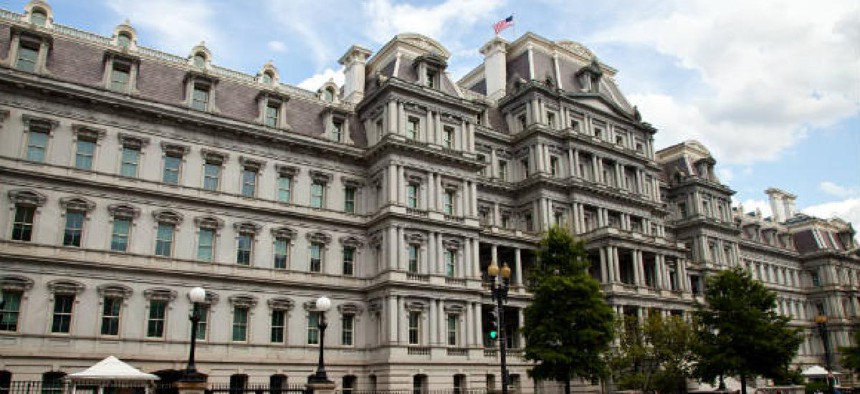OMB job satisfaction scores plummeted in 2020

Almost 40% of OMB survey participants choose strongly disagree when presented with the statement, "my organization's senior leaders maintain high standards for honesty and integrity."

Feds working in the Office of Management and Budget reported last year in the government's annual employee survey that they were unsure of their ability to blow the whistle without fear of reprisal and were distrustful of top agency leadership.
The Office of Personnel Management released results of the 2020 Federal Employee Viewpoint Survey on April 26. OPM officials stressed during a press briefing that the results aren't meant to measure employee morale, but instead the organizational climate of agencies. The 2020 survey also saw some changes in content and was administered in the fall, instead of the spring as is custom.
The results can be sifted down to give an agency-by-agency view that shows changes at OMB, which saw a 16 point downslide in the question on job satisfaction, which feds rated at 59 out of 100.
That rating, now sitting at 59, stands out in the office, which since 2016 has had job satisfaction ratings consistently between 73 and 79. The rating diverges from the federal workforce writ large, which saw gains in governmentwide global satisfaction despite the COVID-19 pandemic.
The results come after some tumultuous years at the agency. Eighty-eight percent of its workforce was the slated to be reclassified under Schedule F, a new type of job classification created by former President Donald Trump in October 2020. Feds in Schedule F positions wouldn't be covered by traditional civil service protections, making their hiring and firing essentially at will. Biden reversed the executive order shortly after coming into office in January.
The FEVS survey was administered in two, six-week sessions that started on September 14 and 21. The Schedule F executive order was released on Oct. 21, 2020, days before the second survey timeline ended. OMB's list of positions to be reclassified broke in the news in late November.
"Had the news leaked that the administration was trying to convert virtually all of OMB's workforce to Schedule F before this survey was done, I'm sure the scores would've even been worse," said Nick Schwellenbach, a senior investigator at the Project on Government Oversight who pointed out OMB's skid in an April 28 tweet.
"I think it speaks volumes that the numbers were this bad before the proposal to convert OMB's workforce to Schedule F had even come out," Schwellenbach told FCW.
One worry among Democrats and federal employee unions opposed to the order was that removing civil service protections from feds would open the door to increased politicization of the federal workforce.
OMB was also embroiled in the events that became the basis for the first impeachment of Trump when it withheld funds obligated for security assistance to Ukraine in 2019. A career staffer from OMB was a witness for the House's investigation.
About 42% of OMB respondents for FEVS said that they disagreed or strongly disagreed with the statement, "I can disclose a suspected violation of any law, rule or regulation without fear of reprisal." Only 40.3% selected either agree or strongly agree, as compared to 68.5% of respondents government-wide.
This is troublesome given OMB's power over how the government spends money and its position in the balance of powers – the office is charged with doling out money within the bounds that Congress specifies, Schwellenbach said.
"The career staff within OMB need to feel empowered to raise concerns when they believe they're being told to violate spending laws," he said.
OMB employees also gave low ratings to questions about their views of agency leadership.
For the question, "in my organization, senior leaders generate high levels of motivation and commitment in the workforce," 64.7% of respondents either chose disagree or strongly disagree. Government-wide, that number was 25.7%.
Almost 40% choose strongly disagree when presented with the statement, "my organization's senior leaders maintain high standards for honesty and integrity," as compared to 8.8% across the government.
About 40%, compared with 7.4% government-wide, also choose strongly disagree when asked if they had "a high level of respect for my organization's senior leaders."
The office was headed by Mick Mulvaney during the first years of the Trump administration before he moved into the White House to work as the acting chief of staff. Russ Vought, Mulvaney's deputy, then served as acting director of the budget office before being confirmed in 2020. He was vocal in his support for Schedule F and OMB's role in leading implementation to the new schedule.
In addition to Schedule F and Ukraine, career staff at OMB were also the target of rhetoric from the Trump officials about the workforce, said Gordon Adams, who worked at OMB in the 1990s and maintains contact with feds at OMB. They were subjected to insinuations "that they were just another part of the fictitious 'deep state' determined to undermine the Trump presidency," Adams said.
"Morale definitely dropped at OMB. The reason is simple: the Trump administration misused the agency and made life difficult for the staff," he said.



